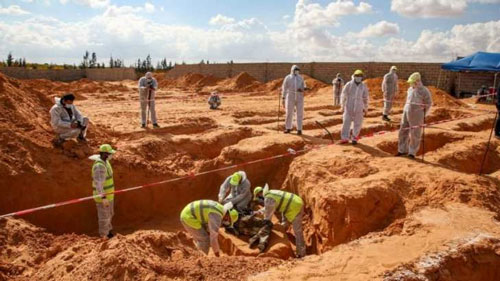Tarhuna
Seventeen bodies have been unearthed in newly found mass graves in western Libya’s Tarhuna region, taking the total exhumed in recent months to 112, the missing persons authority said Saturday.
Lotfi Tawfiq, who heads a committee tasked by the UN-recognised Government of National Accord to search for missing people, said five new mass graves containing 17 bodies had been discovered since Thursday.
The graves are located in Tarhuna, from where eastern strongman Khalifa Haftar’s forces launched an aborted assault last year on the capital Tripoli, seat of the GNA.
The area, some 80 kilometres (50 miles) southeast of Tripoli, served as the main staging point for Haftar’s failed offensive.
The presence of mass graves in Tarhuna was first reported after the withdrawal of Haftar’s forces from western Libya in June.
Libya’s GNA Interior Minister Fathi Bashagha said the graves represented “atrocious acts” that cannot go “unpunished”.
Bashagha said one of the bodies exhumed was Mabrouk Khalaf, a general and former director of information.
The graves found this week are the latest in a string of grim discoveries in Tarhuna, and excavations continue.
Libya, with Africa’s largest proven crude oil reserves, has been wracked by conflict for nearly a decade, since the overthrow and killing of dictator Moamer Kadhafi in a NATO-backed uprising in 2011.
It has since been dominated by armed groups and divided between two administrations that have long been bitterly-opposed: the GNA in Tripoli and a rival administration in the east backed by Haftar.
But the warring factions signed a “permanent ceasefire” last month after UN-sponsored talks in Geneva.
After the deal, Human Rights Watch (HRW) said it welcomed the move to peace, but warned that the agreement failed to provide “a clear commitment and a pathway to accountability for the serious crimes and other abuses perpetuated”.—AP










